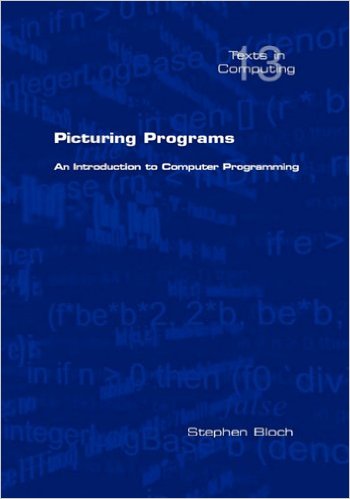
|
FreeComputerBooks.com
Links to Free Computer, Mathematics, Technical Books all over the World
|
|
- Title Picturing Programs: an Introduction to Computer Programming
- Author(s) Stephen Bloch
- Publisher: College Publications (August 23, 2010); eBook (2013)
- Paperback: 486 pages
- eBook PDF files
- Language: English
- ISBN-10: 1848900155
- ISBN-13: 978-1848900158
- Share This:

|
This is a textbook for beginning computer programming, not directed towards learning a particular programming language, but rather at learning to program well. This book can be used at the high school (and perhaps middle school) level, while providing enough advanced concepts not usually found in a first course to challenge a college student.
A first programming course should not be directed towards learning a particular programming language, but rather at learning to program well; the programming language should get out of the way and serve this goal. The simple, powerful Racket language (related to Scheme) allows us to concentrate on the fundamental concepts and techniques of computer programming, without being distracted by complex syntax. As a result, this book can be used at the high school (and perhaps middle school) level, while providing enough advanced concepts not usually found in a first course to challenge a college student.
Those who have already done some programming (e.g. in Java, Python, or C++) will enhance their understanding of the fundamentals, un-learn some bad habits, and change the way they think about programming.
We take a graphics-early approach: you'll start manipulating and combining graphic images from Chapter 1 and writing event-driven GUI programs from Chapter 6, even before seeing arithmetic. We continue using graphics, GUI and game programming throughout to motivate fundamental concepts. At the same time, we emphasize data types, testing, and a concrete, step-by-step process of problem-solving. After working through this book, you'll be prepared to learn other programming languages and program well in them. Or, if this is the last programming course you ever take, you'll understand many of the issues that affect the programs you use every day.
About the Authors- N/A
- Computer Programming
- Introduction to Computer Science
- Object-Oriented Analysis, Design and Programming (OOD/OOP)

- Picturing Programs: an Introduction to Computer Programming (Stephen Bloch)
- The Mirror Site (1) - PDF
-
 Low-Code For Dummies (Jason Bloomberg, et al.)
Low-Code For Dummies (Jason Bloomberg, et al.)
Low-code application development describes creating application software using visual tools and model-driven processes - instead of traditional code-based programming. It's something for professional developers, as well as people in any business role.
-
 Competitive Programmer's Handbook (Antti Laaksonen)
Competitive Programmer's Handbook (Antti Laaksonen)
The purpose of this book is to give you a thorough introduction to competitive programming. It is assumed that you already know the basics of programming, but no previous background in competitive programming is needed.
-
 Scratch Programming Playground: Making Cool Games
Scratch Programming Playground: Making Cool Games
Scratch, the colorful drag-and-drop programming language, is used by millions of first-time learners, and in this book, you'll learn to program by making cool games. Get ready to destroy asteroids, shoot hoops, and slice and dice fruit!
-
 Code Club Book of Scratch (Rik Cross, et al.)
Code Club Book of Scratch (Rik Cross, et al.)
You'll learn how to code using Scratch, the block-based programming language. You'll find instructions to build cool games, animations, and interactive stories. Your friendly robot guide will aid you step-by-step through each project.
-
 How to Design Programs: An Introduction to Programming
How to Design Programs: An Introduction to Programming
This introduction to programming places computer science at the core of a liberal arts education. Unlike other introductory books, it focuses on the program design process, presenting program design guidelines.
-
 Elements of Programming (Alexander Stepanov, et al)
Elements of Programming (Alexander Stepanov, et al)
The book shows that algorithms implemented in a real programming language, such as C++, can operate in the most general mathematical setting. For example, the fast exponentiation algorithm is defined to work with any associative operation.
-
 Answer Set Programming (Vladimir Lifschitz)
Answer Set Programming (Vladimir Lifschitz)
This book book will introduce the reader to the theory and practice of Answer Set Programming (ASP). It will include numerous examples of ASP programs and present the mathematical theory that ASP is based on, and exercises with complete solutions.
-
 Aesthetic Programming: A Handbook of Software Studies
Aesthetic Programming: A Handbook of Software Studies
The book explores the technical as well as cultural imaginaries of programming from its insides, introduces and demonstrates the reflexive practice of aesthetic programming, engaging with learning to program as a way to understand and question.





